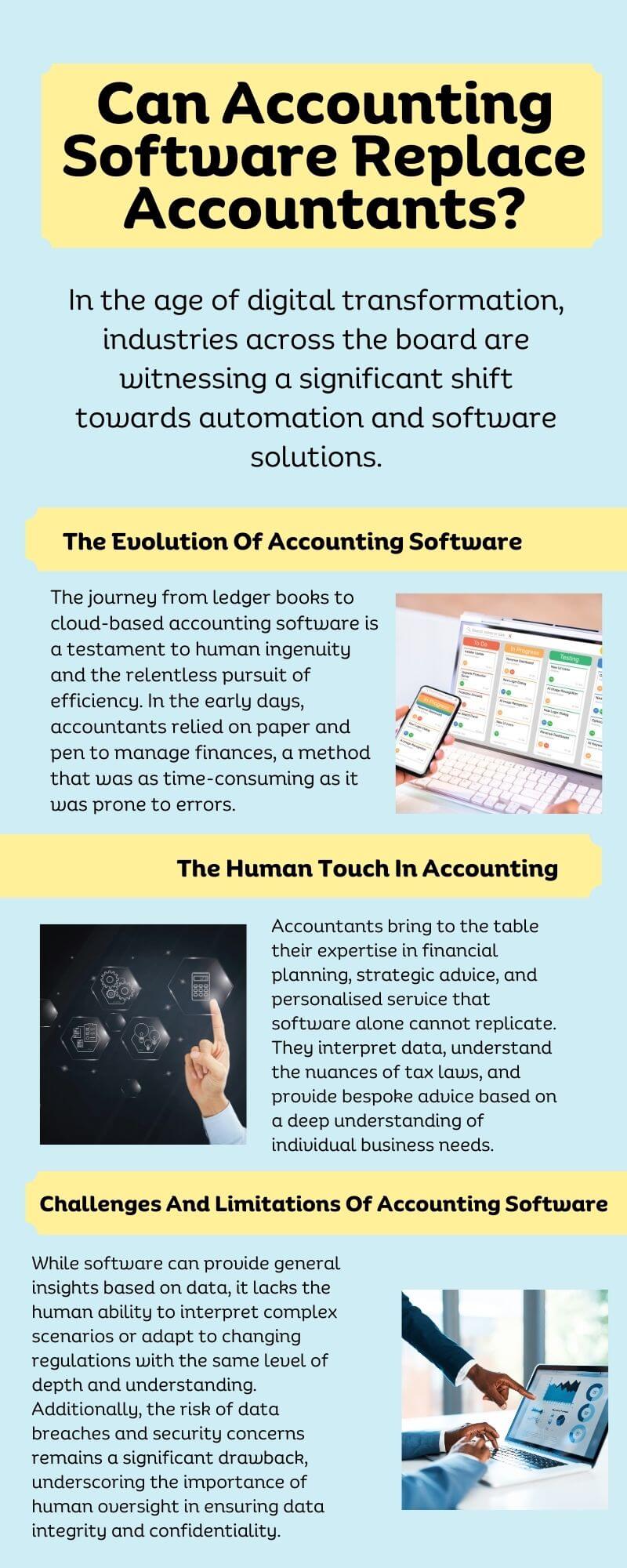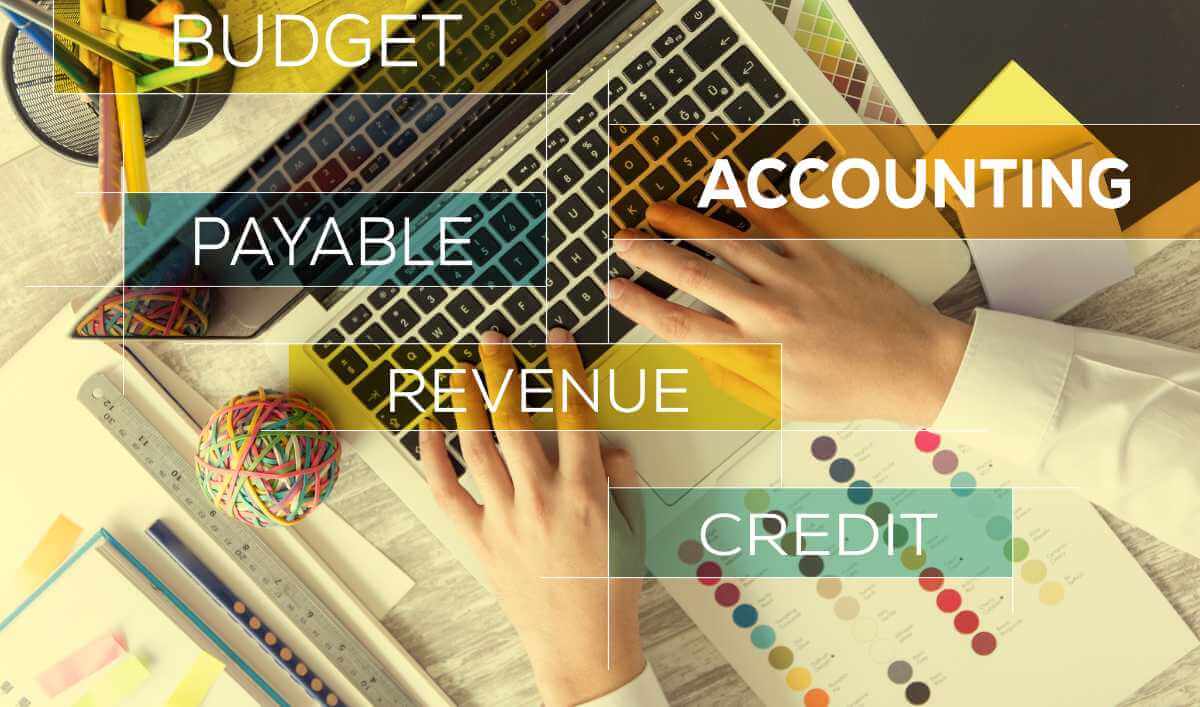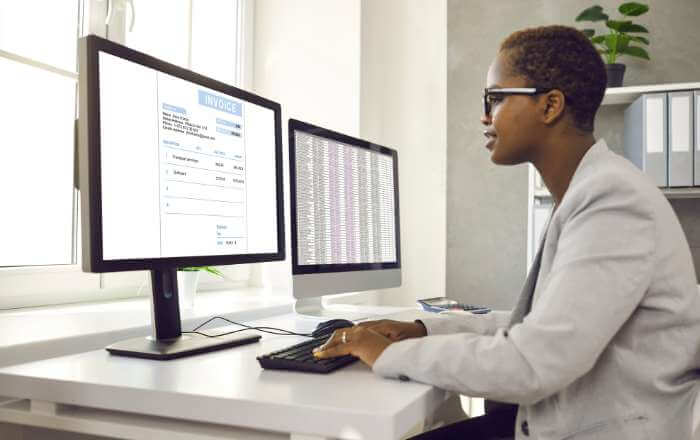In the age of digital transformation, industries across the board are witnessing a significant shift towards automation and software solutions. The accounting sector is no exception, with innovative software increasingly capable of performing complex accounting tasks.
This has sparked a debate: Can accounting software replace accountants? Before we delve into this discussion, it’s crucial to understand the role that such technologies play in the modern business landscape, particularly in Australia, where businesses are always looking for efficient and cost-effective solutions.
The Evolution Of Accounting Software
The journey from ledger books to cloud-based accounting software is a testament to human ingenuity and the relentless pursuit of efficiency. In the early days, accountants relied on paper and pen to manage finances, a method that was as time-consuming as it was prone to errors.

The advent of computers transformed this process, introducing spreadsheet programs that made accounting more manageable but still required significant manual input. Fast forward to today, and we have sophisticated accounting software that automates everything from invoicing to tax preparation, vastly reducing the need for manual intervention.
Capabilities Of Modern Accounting Software
Modern accounting software represents a leap forward in efficiency and accuracy for businesses of all sizes. With features ranging from real-time bank feeds and automated invoicing to comprehensive financial reporting and tax compliance tools, these platforms are designed to streamline financial management processes.
One standout aspect is the use of artificial intelligence and machine learning to predict financial trends, optimise expenses, and provide actionable insights, significantly reducing the workload on human accountants.
Also Read: Unlocking Business Opportunities With Your ABN
However, it’s not just about automation. Today’s software solutions are increasingly user-friendly, enabling not just accountants but business owners and freelancers to take charge of their finances with minimal training. This democratisation of financial management tools is a game-changer, particularly for Australian sole traders and small businesses seeking to maintain lean operations.
The Human Touch In Accounting
Despite these advancements, the question remains: Can software truly replace human accountants? While software excels at handling repetitive and calculative tasks, the human element in accounting goes beyond numbers.

Accountants bring to the table their expertise in financial planning, strategic advice, and personalised service that software alone cannot replicate. They interpret data, understand the nuances of tax laws, and provide bespoke advice based on a deep understanding of individual business needs.
Moreover, the human touch is essential in building trust and relationships. Businesses do not just look for someone to manage their accounts; they seek a partner who understands their vision and can guide them towards financial health and growth. This relationship-based aspect of accounting is where professionals have an irreplaceable role.
Complementary Roles: Software And Accountants Together
The narrative, then, shifts from replacement to complementarity. Accounting software and accountants offer the best of both worlds when used together. Software can handle the day-to-day financial transactions, allowing accountants to focus on more strategic aspects of financial management. This synergy enhances the accountant’s role, enabling them to provide higher value services such as business consulting, financial forecasting, and personalized tax planning.
Also Read: Work-Life Balance For Sole Traders: Top Tips
Real-world examples abound where businesses have leveraged software to automate routine tasks while relying on accountants for insights and strategic advice. This approach not only improves operational efficiency but also empowers businesses to make informed decisions with the support of both cutting-edge technology and professional expertise.
Challenges And Limitations Of Accounting Software
Despite its impressive capabilities, accounting software is not without its limitations. The primary challenge lies in its inability to fully grasp the nuances of a business’s unique financial landscape.

While software can provide general insights based on data, it lacks the human ability to interpret complex scenarios or adapt to changing regulations with the same level of depth and understanding. Additionally, the risk of data breaches and security concerns remains a significant drawback, underscoring the importance of human oversight in ensuring data integrity and confidentiality.
Another limitation is the software’s dependency on the input it receives. Garbage in, garbage out – if the data entered into the system is inaccurate, the outputs will be too. This necessitates a level of vigilance that only human accountants can provide, ensuring that the financial information reflects the reality of the business.
The Future Of Accounting: A Blended Approach
Looking ahead, the future of accounting seems not to be an either/or scenario but a blended approach that leverages the best of both worlds. Innovations in accounting software will continue to transform the way financial data is managed, making processes more efficient and accurate.

However, the role of the accountant will evolve rather than diminish. Accountants will increasingly serve as strategic advisors, focusing on areas where human expertise adds the most value – interpreting data, providing bespoke business advice, and navigating the complex landscape of financial regulations.
This symbiotic relationship between technology and professional expertise is where the industry is heading. As businesses grow in complexity, the need for personalised advice and human insight becomes even more critical. Accounting software serves as a powerful tool in the accountant’s arsenal, enabling them to offer more to their clients than ever before.
Also Read: The Impact Of Artificial Intelligence On Small Business Efficiency
Conclusion: The Role Of Sole’s Free Forever Access
In this context, the introduction of Sole’s Free Forever access marks a significant milestone for Australian businesses, especially for sole traders, freelancers, and small businesses. Sole represents the epitome of how modern accounting software can complement the expertise of accountants.
By offering a robust, user-friendly platform that handles the nuts and bolts of financial management, Sole enables businesses to maintain accurate and efficient financial records at no cost.
But Sole’s value extends beyond just its features. It signifies a commitment to supporting Australian businesses’ growth and financial health. In an environment where every dollar counts, having access to a high-quality accounting tool like Sole can make all the difference. It simplifies financial management and empowers businesses to take control of their financial destiny with confidence.
In essence, Sole and similar platforms are not here to replace accountants but to enhance their role, providing them with more time and resources to focus on what they do best: guiding businesses towards financial success. As we move forward, the collaboration between cutting-edge software and human expertise will continue to be the cornerstone of effective financial management for businesses across Australia and beyond.


